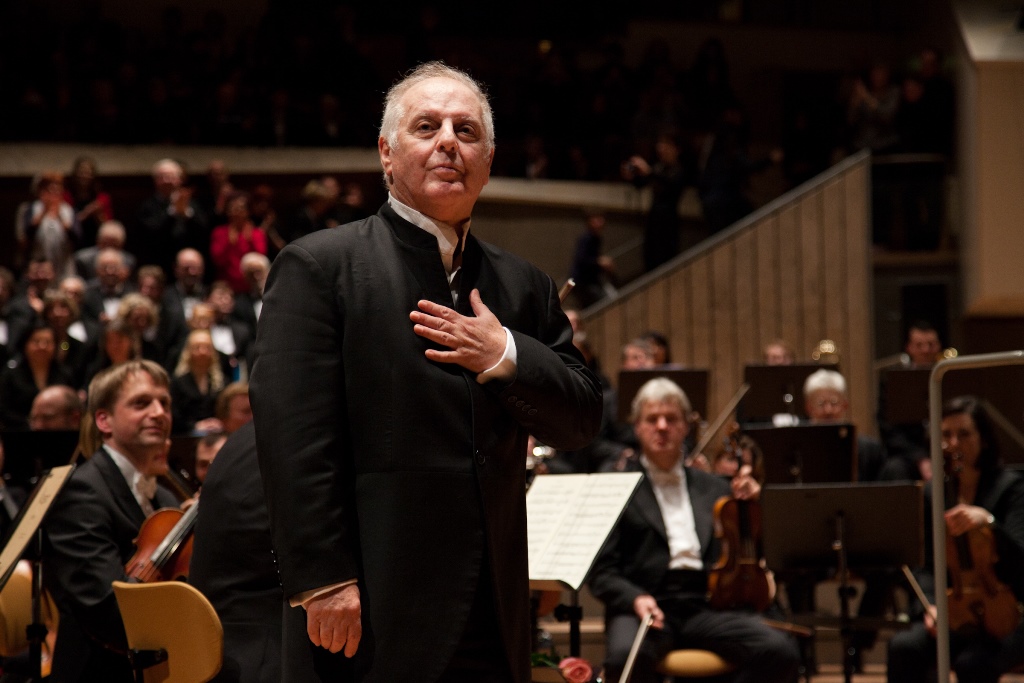Two composers, four symphonies, four concerts
Johannes Brahms, Robert Schumann
The legendary conductor and the historical orchestral ensemble
in an original musical feat at Megaron!
Wednesday 27, Friday 29, Saturday 30 and Sunday 31 October | 20:30 | Christos Lambrakis Hall
Sponsor
AEGEAS
Civil Non-Profit Company
International interest for the Staatskapelle concerts at Megaron
The concerts of the Berlin Staatskapelle under Daniel Barenboim at Megaron mark the launch of their 2021-2022 European tour (with stops at Madrid, Paris, Milan, Zürich, Vienna, Hamburg, München, Cologne and Frankfurt-am-Main), a major event for the international musical scene. For their premiere in Athens, they are accompanied by European journalists and by the Orchestra’s photographer and videographer, who will record moments from the rehearsals and the concerts. The material produced at Megaron will then be used to promote the European tour of the Staatskapelle to the international Media as well as to social media, thus making the orchestra’s friends feel as though they themselves are also present in the backstage and rehearsal areas, together with the conductor, the musicians and the technicians.
Daniel Barenboim…
… is one of the most influential figures of the international music scene. The recipient of numerous awards for his work as conductor, pianist, pedagogue and author, he has been appearing for many decades at the world’s major symphonic centres and travels around the globe promoting innovative projects advocating peace, art and the support for young artists. Daniel Barenboim’s life is made of the stuff of myth: at age 10, he made his debut as a soloist in Vienna and Rome, at 12 he met the legendary conductor Wilhelm Furtwängler, who called him “a true phenomenon”, at 13 he started recording for major record labels, working with emblematic maestros such as Klemperer and Barbirolli, and at 17 he played for the first time in New York as a soloist, under the great Leopold Stokowski. He has collaborated with leading orchestral ensembles and lyrical theatres of our times, either as conductor or as artistic or musical director, promoting not only the classical symphonic and operatic repertoire, but also the modern and contemporary one, with concerts, performances and award-winning audio and video recordings.
Daniel Barenboim comes to Megaron to present to the Greek audience a musical feat: over four evenings, he will present all four symphonies of two emblematic composers of the Romantic period – Johannes Brahms and Robert Schumann. On Wednesday 27, Friday 29, Saturday 30 and Sunday 31 October, at 8:30 pm, in Christos Lambrakis Hall, he will conduct the Berlin Staatskapelle, the historic German orchestra with which his artistic career has been inextricably linked since 2000, when he was appointed as its principal conductor for life. Together, they have presented large-scale music cycles, both in Berlin and on tour, which include 10 operas by Wagner, the complete symphonies of Beethoven, Schumann, Schubert and Bruckner, the symphonic works and the orchestral songs of Mahler, operas and compositions for orchestra by Berg, Schönberg and Debussy, as well as world premieres of works by contemporary composers. They have also recorded together many CDs with operas, symphonies and piano concertos of the romantic era and of the 20th century.
The programme day by day
The programme of each concert consists of one Symphony by each composer, as follows:
Wednesday 27.10
Robert Schumann: Symphony no. 1 in B flat major, opus 38, “Spring” (30΄)
Johannes Brahms: Symphony no. 1 in C minor, opus 68 (48΄)
Friday 29.10
Robert Schumann: Symphony no. 2 in C major, opus 61 (40΄)
Johannes Brahms: Symphony no. 2 in D major, opus 73 (40΄)
Saturday 30.10
Robert Schumann: Symphony no. 3 in E flat major, opus 97, “of the Rhine” (35΄)
Johannes Brahms: Symphony no. 3 in F major, opus 90 (33΄)
Sunday 31.10
Robert Schumann: Symphony no. 4 in D minor, opus 120 (32΄)
Johannes Brahms: Symphony no. 4 in E minor, opus 98 (42΄)
With these four concerts in Athens, Daniel Barenboim and the Berlin Staatskapelle honour in their own musical way not only Brahms and Schumann, but also an important anniversary for Megaron, the completion of 30 years since its founding.
Megaron’s concerts of the famous European ensemble are sponsored by AEGEAS Non-Profit Civil Company.
Two composers, four symphonies, four concerts
Robert Schumann
In terms of composing new works, the decade 1841-1851 was the most prolific for Robert Schumann (1810-1856), who greatly influenced many composers after him. During this decade, he devoted himself to composing songs, chamber music and instrumental works, which essentially represent the evolution of his work for the piano and assimilate elements of Beethoven’s legacy.
The First Symphony – “Spring” (1841), which Schumann composed inspired by Adolph Böttger’s “Poem of the Spring”, also encouraged and spurred by his wife Clara, was premiered in Leipzig with Felix Mendelssohn at the podium, yet was not met with the enthusiastic reception expected by its creator.
Symphony No. 2 was published six years later and is dedicated to Oscar I, King of Sweden and Norway. The composer finished the first sketches of this work in 1845 but had difficulty with its orchestration, because of his mental instability and poor health, which nevertheless did not undermine the style of the work, which is imbued with feelings of overt optimism and heartfelt lyricism. The work was premiered in 1845, again by the Leipzig Gewandhaus Orchestra, conducted by Mendelssohn. It gained great popularity in the 20th century, when its unusual structure and Shumann’s value as a symphonist were recognised.
The Third Symphony, “of the Rhine”, was composed in 1850, after a calm and pleasant journey of the composer, accompanied by his wife, in Rhineland, whose atmosphere comes to life again with the work’s music. It was premiered in 1851 in Düsseldorf, with the composer conducting the orchestra, but was received with mixed feelings by the audience and the critics.
Schumann worked on the first version of Symphony No. 4 in 1841, yet because of the work’s moderate appeal, he made extensive changes to arrive, ten years later, at the final published version of the score as we know it today. The work was premiered in December 1851 by the Leipzig Gewandhaus Orchestra, yet it was Franz Liszt who eventually stole the show, as he had agreed to appear together with Clara Vick, in a piano duet. The paradox is that, although the work’s unusual form caused confusion among the public, the critics viewed it rather positively.
Johannes Brahms
Johannes Brahms (1833-1897) was 44 years old when he completed his First Symphony. He had begun to work on it at a young age (1854) but had abandoned it for a long time, as he felt it to be eclipsed by the appeal of Beethoven’s and Schumann’s symphonic works. Although it took him more than two decades to complete (1876), its success was impressive. Indeed, several critics, noting the affinity of Brahms’ musical idiom to that of Beethoven, even named Symphony No. 1 “[Beethoven’s] Tenth”!
On the contrary, the delightful Symphony No. 2 was written over a much shorter period of time, in the summer of 1877, in Austria. A few months later, it was presented to the enthusiastic Viennese audience, who were bewitched by its light and cheerful style.
The “much too famous” –in the words of Brahms himself– Third Symphony is the only work composed by the great German composer in 1883. The Viennese applauded enthusiastically its performance by city’s Philharmonic, which was given in December of that same year. Soon, it would be played all over Europe and shortly afterwards it would cross the Atlantic to also conquer the United States. Conductor Hans Richter called it “Heroic”, because of its robust structure and optimistic character, reminiscent of Beethoven’s symphony of the same name.
Two years later, always in Austria, Johannes Brahms embarked on the composition of Symphony No. 4, whose score narrowly escaped being destroyed by the flames, when a fire broke out in the house where the composer lived! With this elegiac orchestral work, Brahms returns to the classicist forms and pays his own tribute to Bach. The composer took to the podium for the first time in 1885 in Meiningen, in order to conduct himself the work’s premiere. Strangely enough, however, it was another premiere of the Fourth that would go down in the history books: Its first performance in Leipzig. It was a real triumph for Brahms, as the audience went into raptures.
Ticket prices per concert
€ 15 (students, young persons up to 25, unemployed, persons with disabilities, 65+, families having many children) ● € 22 ● € 36 ● € 50 ● € 60 ● € 70 ● € 80
Ticket package for all 4 concerts: 20% discount
All applicable health protection measures will be observed. For details, see here:
Tickets
210 72 82 333, megaron.gr
and in all shops of the Public chain


